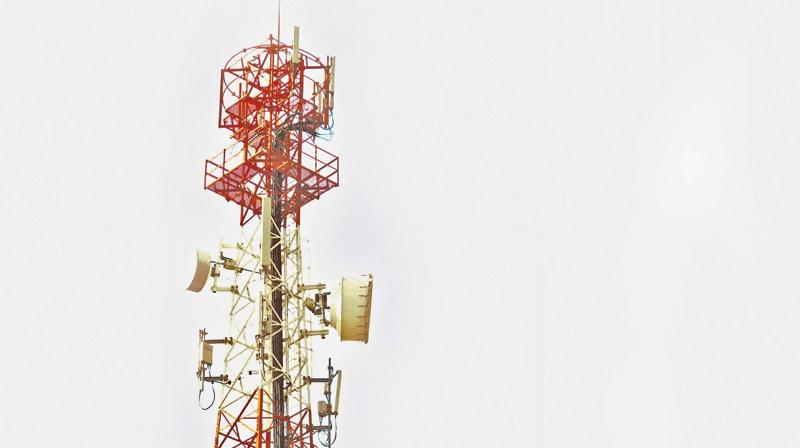Get dt collectors’ nod for fixing mobile towers: Madras high court

Chennai: The Madras high court has held that the private mobile phone service providers have to obtain permission from the district collectors concerned for installation of base trans-receiver station (BTS towers) (cellphone towers).
A division bench comprising Justices M.Sathyanarayanan and B.Pugalendhi gave the ruling while disposing of a batch of 15 PILs, which sought closure or not to erect the cellphone towers on the ground that the private service providers either constructed or are constructing the cell phone towers without obtaining any permission from local authorities and that these towers are responsible for innumerable health hazards to the nearby residents.
After hearing both sides, the bench raised two issues. 1. Whether the BTS towers can be permitted in the residential area, nearby residential buildings and schools and whether it would cause any health hazards to the nearby residents? 2. Whether any permission or no objection certificate is required for installation of BTS towers from the local bodies/panchayats or any other authorities.
Answering the first issue, the bench said the increased use of mobiles in India has raised the public concern over
possible health issues associated with exposure to electromagnetic energy and electromagnetic field radiation and this concern was prevailing all over the world. The World Health Organisation (WHO) was conducting a detailed study.
The International Commission on Non Ionising Radiation Protection (ICNIRP) has issued various guidelines and norms, as recommended by the WHO. The WHO, by referring to approximately 25,000 articles published around the world over the past 30 years, on health issues arising out of BTS towers has concluded that the available evidence does not confirm the existence of any health hazards to the mankind from exposure to low level electromagnetic field, the bench added.
The bench said the WHO in its report issued in May 2006 on electromagnetic field and public health for base
station and wireless technologies has concluded that, there was no convincing scientific evidence that the weak radiation frequency (RF signals) from base stations and wireless networks cause adverse health effects. The said finding was also reiterated in the year 2011 that no adverse health effects have been established as being caused by mobile phone towers. In September 2013, with regard to a query, WHO has made online reply that the status as on date provide no indication that environmental exposure to radio frequency fields such as from base stations increases the risk of cancer or any other disease, the bench added.
The bench said the WHO had also established the EMF project in the year 1996 to assess the scientific evidence of possible health effects in the frequency range from 0 to 300 GHZ. Over 15 national authorities were involved in the EMF project and it was also overseen by eight International Organisations. The government of India adopted the ICNIRP guidelines in the year 2008 for basic restrictions and limiting reference levels of electromagnetic radiation from mobile towers. The above prescribed limits for EMF radiation from base station in India were 1/10th of International Prescribed limits of ICNIRP. The Government of India in its official memorandum issued EMF norms pursuant to the report of the committee constituted in compliance of the directions of the high court of Allahabad, the bench added.
Citing 3 judgments of this court, the bench said, “In view of the specific stand taken by the department of telecommunication and the reports of WHO, there are no materials on record to confirm the existence of any health hazard from exposure to low level electromagnetic field and as stated by the three earlier orders of the different division benches of this court, this court cannot dwell into those aspects as an expert. Thus, issue no.1 is answered accordingly”.
With regard to second issue, the bench said it was the concern of the petitioners that tower was constructed without permission from the competent authorities and in the absence of any guidelines, if any accidents take place, due to natural calamities, the innocent people in and around the tower would be affected, leading to irreparable loss. Though the service providers claim that all precautionary steps were taken to ensure the safety in the construction of BTS Towers, the fact remains there were many incidents in the past, where valuable lives of the innocent people were taken away. The grant of license to telecom companies was exclusively under the domain of the central government.
The Parliamentary standing committee on information technology has emphasized on the need of a uniformed guidelines for setting up of telecom towers. Pursuant to the same, the department of telecommunication has also framed certain advisory guidelines for the state government for issuance of clearance for installation of mobile towers with effect from August 1, 2013. However, the state level telecom committee and district level telecom committee as recommended under the guidelines to address the public grievances relating to the installation of towers and issues relating to telecom infrastructures, were not yet constituted by the Government of Tamil Nadu, the bench added.
The bench said the Government of Tamil Nadu implemented the India Telegraph Right of Way Rules, 2016, in the state and while implementing the said rules, it has specifically mentioned that detailed guidelines will be issued by the Information Technology department for the successful implementation of ITRW Rules. But no such guidelines have been framed so far. “It is made clear that the existing guidelines as per GO dated April 1, 2002, for installation of
overground telecom infrastructure (towers) in private buildings, be continued as it was not covered by the ITRW Rules”, the bench added.
Citing a judgment of this court, the bench said, “In view of the above GO and the above cited decision, the private service providers have to obtain permission from the district collectors concerned as per the 2002 GO”.

